The secret to setting up hack-proof passwords lies in creating something that is both strong and memorable.
Following are the key elements of a really secure password.
Length and Complexity
A good password should be:
- At least 12-16 characters long
- A mix of uppercase and lowercase letters, numbers, and symbols
Longer passwords are generally more secure. For example, a 16-character password could take trillions of years to crack, making it virtually unbreakable.
Uniqueness and Randomness
Your password should be:
- Unique for each account
- Not based on personal information or common words
- Randomly generated or using unrelated words
Avoid using easily guessable information like birthdays, names, or dictionary words.
Memorability
While randomness is important, you also need to be able to remember your password. Some strategies include:
- Using a passphrase: Combine unrelated words with numbers and symbols
- Creating an acronym from a memorable sentence
- Using deliberate misspellings or substitutions
For example, “HorsePurpleHatRunBay” is a strong passphrase.
Password Management
To manage multiple strong passwords:
- Use a reputable password manager
- Never reuse passwords across accounts
- Change passwords periodically, especially for high-security accounts
Additional Security Measures
Here are a few more ways to guarantee that password is hack-proof:
- Enabling multi-factor authentication (MFA) when available
- Being cautious of phishing attempts asking for your password
- Not sharing your password with others
Remember, the goal is to create a password that’s difficult for others to guess or crack, but easy for you to remember. A combination of length, complexity, uniqueness, and good password management practices is the true secret to a good password.





0 Comments